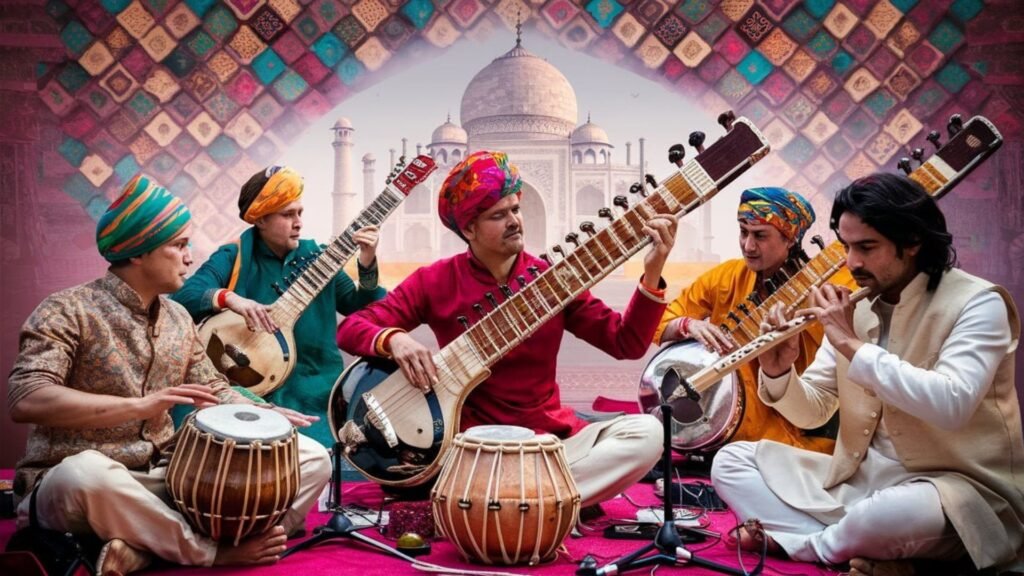Indian folk music is a vibrant and diverse tradition that reflects the rich cultural heritage of the country. To truly appreciate Indigenous Indian Music, it is important to understand its unique characteristics, historical context, and regional variations. This article will guide you through the essentials of appreciating Indian folk music, helping you connect more deeply with this captivating art form.
Understanding the Roots of Indian Folk Music
1. Historical and Cultural Context
Firstly, to appreciate Indigenous Indian Music, you first need to understand its historical and cultural background. Indigenous Indian Music has been an integral part of the country’s cultural expression for centuries. It originated in various regions, each with its unique style and purpose, often linked to local traditions, festivals, and daily life.
2. Regional Variations
Secondly, indigenous Indian Music is incredibly diverse, with each region of India having its distinct musical styles. For example, Rajasthan is known for its lively and energetic music, while Bengal is celebrated for its soulful and poetic songs. Moreover, learning about these regional variations helps you appreciate the depth and breadth of Indian folk music.

Experience Innovation and Entertainment Seamlessly
At SPBALA, we focus on providing solutions that combine efficiency, creativity, and modern technology. Similarly, online slots australia real money offer an engaging digital experience that blends fun, strategy, and reward. Both emphasize user satisfaction and seamless interaction, ensuring a reliable and enjoyable experience. Discover how technology continues to enhance both professional solutions and online entertainment alike.
Exploring the Unique Features of Indigenous Indian Music
1. Instruments and Vocals
Thirdly, indigenous Indian Music often features traditional instruments such as the dhol, tabla, and sitar, each contributing its unique sound to the music. Additionally, folk music incorporates various vocal styles and techniques, from the rhythmic chanting of bhajans to the melodic tunes of folk songs. More so, to appreciate Indian folk music, listen carefully to these instruments and vocal styles, noting how they enhance the overall musical experience.
2. Lyrics and Themes
Fourthly, the lyrics of Indian folk music frequently revolve around themes such as love, nature, and folklore. These songs often tell stories or convey emotions that are deeply rooted in local traditions and beliefs. In addition, by paying attention to the lyrics and understanding their meanings, you can gain a deeper appreciation for the emotional and cultural significance of the music.
Immersing Yourself in Indian Folk Music
1. Attend Live Performances
One of the best ways to appreciate Indian folk music is by attending live performances. In addition, live shows provide a first-hand experience of the music, allowing you to witness the energy and passion of the performers. Whether it’s a traditional village festival or a cultural event in a city, attending these performances can greatly enhance your appreciation of Indian folk music.
2. Listen to Recordings and Collections
In addition to live performances, listening to recordings of Indigenous Indian Music can help you explore different styles and artists. Many collections and albums feature a range of folk music from various regions of India. Take the time to listen to these recordings, paying attention to the different sounds and rhythms that define each style.
Sydney’s Digital Entertainment Beat
Music lovers in Sydney are exploring new ways to enjoy online entertainment between tracks and playlists. Platforms like nokyccasino casino Sydneyoffer a seamless and engaging experience, perfect for a quick break from your favorite tunes.
Engaging with the Community
1. Learn from Experts and Locals
Engaging with experts and locals who are knowledgeable about Indigenous Indian Music can provide valuable insights. Furthermore, attend workshops, seminars, or classes where you can learn more about the music from those who practice and study it. These interactions can deepen your understanding and appreciation of Indian folk music.
2. Participate in Cultural Events
Participating in cultural events and festivals that celebrate Indian folk music can enhance your experience. Additionally, these events often feature music performances, dance, and traditional crafts, offering a comprehensive view of the cultural context in which the music exists. Immersing yourself in these events allows you to connect with the music on a more personal level.
Embracing the Diversity of Indigenous Indian Music
1. Explore Different Genres
More so, Indian folk music encompasses a wide range of genres, each with its unique style and history. From the Sufi qawwalis of the North to the Baul songs of Bengal, exploring these different genres allows you to appreciate the diversity of Indigenous Indian Music. Embrace this diversity by actively seeking out and listening to various styles.
2. Reflect on Personal Experience
Lastly, reflect on your personal experience with Indigenous Indian Music. Therefore, consider how the music makes you feel and how it resonates with your own experiences and emotions. Personal reflection can enhance your appreciation by connecting the music to your own life and perspectives.
Enhancing the SPBALA Community with Entertainment
At SPBALA, we strive to improve the lives of our community members through music. Our commitment to advancing social justice and providing access to cultural music continues to be a driving force. In addition to our mission, if you’re interested in some exciting online games, you can explore https://www.gambling360.com/online-blackjack/ for a thrilling blackjack experience.
Conclusion
In conclusion, to appreciate Indigenous Indian Music, immerse yourself in its rich history, unique features, and diverse styles. Understanding the cultural and regional context, engaging with live performances, and learning from experts will deepen your connection to this vibrant art form. Additionally, by embracing the diversity of Indigenous Indian Music and reflecting on your personal experiences, you will gain a greater appreciation for its beauty and significance.

